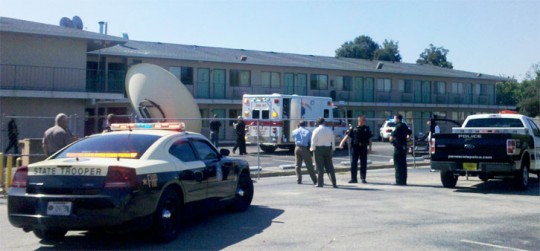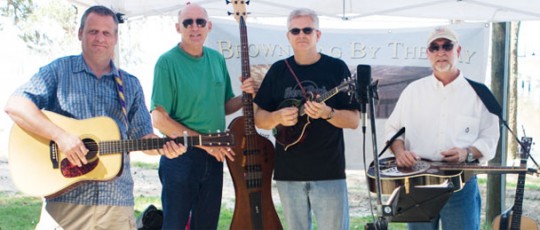Two Deputies Cleared in 2010 Shooting Death
April 1, 2011
The State Attorney’s Office said Thursday that last year’s officer involved shooting at a Pensacola motel was justified.
Michael Scott Lee was shot September 29, 2010, at the Motel 6 on Pensacola Boulevard. A total of 12 rounds were fired at Lee by two Escambia County Sheriff’s Office deputies that had responded to the motel room in response to a Pensacola Police Department missing persons case. Deputy Jason Ates and Deputy Jennifer Lovely-Gandy returned fire after Aties was shot in the upper thigh.
“Based on the facts of this case, it was reasonable for Deputy Ates and Deputy Lovley-Gandy to believe that the use of deadly force was necessary to prevent imminent death or great bodily harm to themselves or others,” Assistant State Attorney Bridgette M. Jensen said in her final report on the incident. “No further legal action is warranted.”
Blood and urine tests showed that Lee had multiple drugs in his system at the time of his death, including Cannabis and methamphetamine.
Pictured above: The scene after a deputy was shot and a suspect was shot and killed in September at the Motel 6 on Pensacola Boulevard. NorthEscambia.com file photo courtesy WEAR TV, click to enlarge.
Appeals Court Sets Health Care Arguments
April 1, 2011
The U.S. Eleventh Circuit Court declined on Thursday to put Florida’s challenge of the federal health care law before the full ten-judge court, but it did grant a hearing before the three-judge panel relatively quickly, setting oral arguments in June.
The Court will hear the case by Florida and several other states on Wednesday, June 8, in Atlanta with each side having one hour for oral argument.
The parties won’t learn the three judges who will hear the case until two weeks before the arguments.
In the trial court, a federal judge in Pensacola struck down the entire federal health care law, and blocked enforcement of it, but lifted that order when the federal government pursued its appeal to the Circuit Court.
Tax Hike: Shopping Now More Expensive In Atmore
April 1, 2011
Shopping, living, buying gas and even dying is more expensive beginning today in Atmore thanks to new tax hikes.
The Atmore City Council voted to raise many taxes and fees — including the city’s sales tax. Beginning April 1, sales tax is up one percent — from 8 to 9 percent, along with increases in several other taxes:
- Atmore’s gas and fuel tax jumped from 2 cents to 3 cents.
- Lodging tax, such as that on motel and hotel rooms, increased from 8 percent to 10 percent.
- Atmore’s rental tax on tangible items like vehicles, trailers and clothes jumped from 2 to 5 percent.
City officials said the higher taxes are needed in order to maintain city services despite money saving measures like purchasing used police cars and fire trucks.
The price of a lot in a city-owned cemetery was doubled back in February for residents within the police jurisdiction — from $450 to $900. For everyone else, cemetery lots are now $1,000. There’s also a $125 perpetual care fee, and a $100 burial permit fee.
Pictured: Two shopping centers in Atmore. NorthEscambia.com photos, click to enlarge.
Mandatory School Uniforms At Bratt Elementary Next Year?
April 1, 2011
The Bratt Elementary School Advisory Council wants to know if mandatory school uniforms should be considered for the next school year.
The advisory council is conducting a survey “to see what parents and guardians thought about the idea before going through the process of bringing the option to a vote”. With their child’s report card Thursday, parents and guardians received a survey form asking if the SAC should consider the option of school uniforms. The survey form is not a vote for or against school uniforms for the 2011-2012 school year.
According to the survey form, the “Escambia County School District is asking schools to consider the option of having mandatory school uniforms”.
For a copy of the survey form, click here.
Cottage Hill Neighborhood Watch Organization Meeting Tonight
April 1, 2011
An organizational meeting for the new Cottage Hill Neighborhood Watch will take place this evening.
“From Jim Allen Elementary to McKenzie Road, we are taking back our streets, said Marsha Ryland, one of the driving forces behind the neighborhood watch group.
The meeting will take place at 6 pm. at the First Baptist Church of Cottage Hill, 230 Williams Ditch Road in Cantonment. Anyone in the Cottage Hill community is welcome to attend the meeting.
Drug Tests For Welfare Recipients?
April 1, 2011
Welfare recipients would need to pass drug tests – and pay for them — before receiving financial assistance under bills traveling in both chambers that backers say will send a tough but needed message to substance abusers who use taxpayer money to feed their addiction instead of their families.
On Thursday, the House Judiciary Committee on a 13-5 vote approved a measure (HB 353) that would deny benefits to recipients of temporary financial assistance for at least one year if they fail a drug test. A second failed test would kick them off the assistance rolls for three years. Food stamp eligibility would not be affected.
A Senate bill (SB 556) is awaiting action in that chamber’s budget committee.
“Until we bring accountability into the process, there is no way we will ever get a handle on the huge impact substance abuse has on our communities,” said Rep. Dennis Baxley, R-Ocala. “We are becoming enablers in this sick relationship.”
Backers said taxpayers should not be paying financial assistance to recipients who are abusing drugs and may use the funds instead to fuel a drug or alcohol addiction. They said further that denying benefits to recipients with substance abuse problems may provide the incentive for them to seek help.
“This is about trying to get to the real core problem in the family,” Baxley said. “Until you do, you will never solve the problem.”
About 113,000 Floridians are receiving temporary cash payments under a program administered by the Department of Children and Families that is expected to cost $211million for the current fiscal year. The agency currently does not screen recipients for drugs. Federal law allows states to deny benefits to recipients convicted of a felony drug offense, a provision Florida has chosen not to adopt. A pilot program conducted between 1999 and 2001 was discontinued after researchers determined it was not cost effective.
Critics say subjecting all recipients to drug tests penalizes their families, especially their children, regardless of whether the parents are using.
In two-parent households, both parents would have to take separate tests, which could run from $10 to $70 a piece.
At the very least, skeptics say the state should at least pick up the tab.
“If the state is going to go down the road from a presumption of innocence to suspicious-less presumption of guilt for only the poorest among us it should at least bear the cost,” said Rep. Jeff Brandes, R-St. Petersburg. “Members, we are embarking on dangerously thin ice.”
State officials who would be charged with overseeing the program said many of the details still need to be worked out. Jennifer Lange, program director overseeing DCF’s welfare programs said, in all likelihood, the state would put out a bid and contract with a private company or companies to administer the test and process the results. Details as to what drugs would be tested for and other protocols would be developed by rule.
Mark Fontaine, a lobbyist for the Florida Drug and Alcohol Abuse Association, said nothing in the bill addresses recipients who have tested positive for drugs but have entered or completed substance abuse programs and are now clean. “If that is your goal, if someone takes the initiative to get treatment then they should be able to come back,” Fontaine said.
But even if recipients could opt back in after undergoing treatment, there are often waiting periods for programs, and the lack of slots would prolong the lapse in needed benefits, he said. He noted that the Senate budget has so far eliminated any state funding for drug treatment.
“They will have no access to treatment because there will be no treatment,” he said.
By Michael Peltier
The News Service of Florida
Monthly Barrineau Park Music Tonight
April 1, 2011
There will be plenty of good entertainment on stage tonight in Barrineau Park — and it’s free. The monthly Barrineau Park Music Night will be tonight at the Barrineau Park Community Center. The featured local groups tonight are The Wayfarers and TruGrass.
The singing starts at 6:30 p.m. Food and refreshments will also be available beginning at 6 p.m.
The event is family-friendly — no alcohol is permitted on the property, and no smoking is allowed in or near the building.
For more information, call (850) 587-5575. The Barrineau Park Community Center is located on Barrineau Park School road, about three miles west of Molino.
Pictured above: The Wayfarers will perform tonight during the monthly Barrineau Park Music Night. Pictured below: Trugrass will also perform. Submitted photos for NorthEscambia.com, click to enlarge.
Florida Budget Passes Committee Setting Up Final Clashes
April 1, 2011
he final draft of the Senate’s spending plan for the coming fiscal year easily passed the Senate Budget Committee on Thursday, setting the stage for a clash with the House over how to craft a spending blueprint hammered by the end of federal stimulus dollars and an anemic economic recovery.
The measure passed on a 16-4 vote. Two Democrats — Sens. Bill Montford of Tallahassee and Gary Siplin of Orlando — joined Republicans in approving the measure. The House passed its version Wednesday evening on a 15-8 party line vote.
The nearly $69.8 billion plan reduces public education spending by almost 7.4 percent, shrinks Bright Futures scholarships by $1,000 per student because of an offsetting tax credit and slashes Medicaid rates for providers from hospitals to nursing homes. Supporters say the measures are needed to avoid a tax increase as the state closes a $3.75 billion budget shortfall.
“I wish the decisions were simpler and easier,” said Senate Budget Chairman J.D. Alexander, R-Lake Wales.
But Senate Minority Leader Nan Rich, D-Weston, blasted the plan for failing to “meet the basic needs of the people” and refusing to look at potential revenue sources, including tax exemptions for special interests.
“I believe there are Floridians that are not sharing in the pain,” Rich said.
As in the House, an amendment to stop the privatization of some prisons was beaten back, making it a near-certainty that some prisons will be handed over to for-profit corporations. The Senate plan would privatize prisons over essentially the southern third of the state while a more modest House proposal would only address Broward and Miami-Dade counties.
“I’m not opposed to privatization,” said Sen. Mike Fasano, R-New Port Richey, the head of Senate subcommittee that handles prison budgets and itself proposed contracting with private providers for inmate health care. “What I have great concerns about is turning over the public safety of this state to private corporations.”
Fasano also argued the privatization would be the most sweeping such plan in the nation and worried that around 5,000 prison guards and parole officers — whose jobs would also be privatized under the proposal — could be out of work.
But Alexander, who inserted the language into the budget crafted by Fasano’s committee, said the move would save the state money. He also brushed aside concerns about the future of state employees.
“We believe the vast majority will be employed under a successful bidder,” he told reporters after the meeting.
The amendment splintered the usual partisan breakdowns on budget votes, with Sens. Thad Altman, R-Melbourne, and Mike Bennett, R-Bradenton, voting for Fasano’s proposal and Democrat Siplin opposing it.
A handful of bills meant to bring state law into line with the spending plan remained to be passed Friday, including a bill dealing with health insurance for state workers and one ending an affordable-housing trust fund. The health insurance bill was abruptly postponed Thursday, and Alexander said he planned to soften a reduction in state subsidies for family members’ premiums.
The votes Thursday brought into sharper focus the differences House and Senate negotiators will have to hammer out after each chamber approves its version of the spending plan. Lawmakers have moved quickly through the earlier stages of the budget process, but Alexander said that was likely to slow down soon enough.
“I think that these issues are so profoundly difficult the Legislature to consider that, at the end of the day, although we’re theoretically perhaps a week ahead of schedule, I expect that we will exhaust that week coming to terms with these decisions,” he said.
Asked if he believed conference committee negotiations would be more difficult than usual, Alexander said: “I think that all aspects of this are going to be more difficult than anything I’ve ever seen. This is a very challenging set of decisions for us to make.”
House Budget Chairwoman Denise Grimsley, R-Sebring, said late Wednesday that she also expected a difficult conference process, given that the chambers’ proposals are separated by nearly $3 billion.
“It’s just going to be tough to try to reconcile our differences,” she said.
Among the potential pitfalls: Differences in the plans to reform state pensions; a plan by the Senate to bring water management districts under tighter legislative control; and the House’s $330 million sweep of the State Transportation Trust Fund, a move that is regularly staunchly opposed by the Senate.
Grimsley signaled some hesitance about the water management district, and said she found it hard to see how the budget would balance without the trust fund sweep. “Not with this much shortfall,” she said.
By Brandon Larrabee
The News Service of Florida







